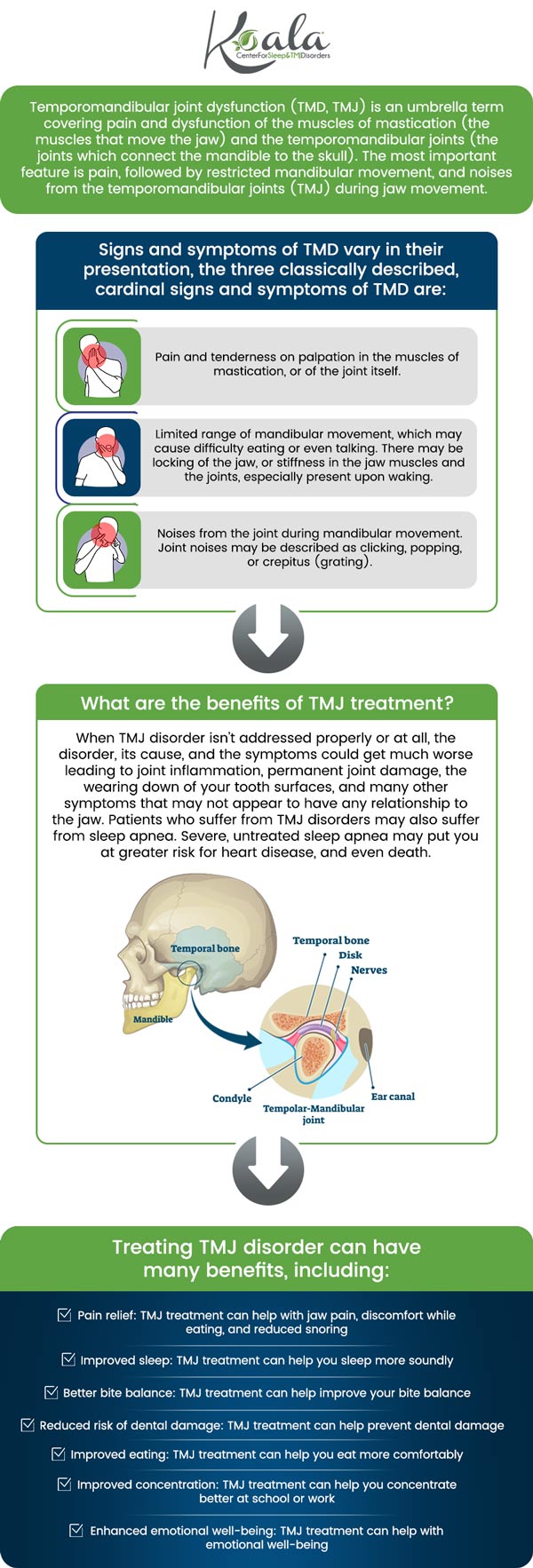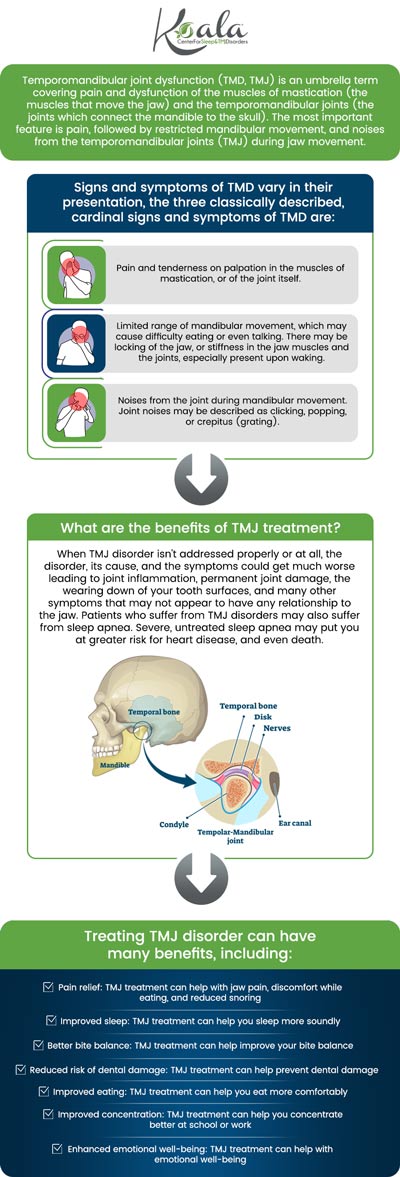How Do I Know if I Have TMJ or TMD?
TMJ stands for temporomandibular joint, while TMD refers to temporomandibular disorder that affects that joint. If you have symptoms of TMD including discomfort in your jaw, restricted movements, inflammation or clicking sound, come to Koala Center For Sleep & TMJ Disorders and talk to our providers. For more information, please contact us or request an appointment online. We are conveniently located at 413 North 17th Avenue Ste. #100 Wausau, WI 54401.


Table of Contents:
What is the difference between TMJ and TMD?
How do I know if I have TMJ or TMD?
What are the common symptoms of TMJ?
What are contributing factors for TMJ?
What is the prevention for TMJ?
TMJ stands for the “temporomandibular joint,” which is the joint connecting your lower jaw (mandible) to your skull. This joint facilitates smooth jaw movements, enabling essential everyday functions like chewing, speaking, yawning, and even comfortably sleeping.
TMD, or “temporomandibular joint disorder,” refers specifically to conditions involving dysfunction, pain, or discomfort in this joint and the muscles that control jaw movement. Common signs of TMD include jaw pain, tenderness, limited jaw mobility, clicking or popping noises when moving the jaw, headaches, and even difficulties with restful sleep.
One of the most common indicators of TMJ disorder is experiencing pain or tenderness around your jaw joint, face, or temples. You might notice discomfort or soreness when chewing, speaking, yawning, or opening your mouth wide. Patients at Koala frequently report clicking, popping, or grating sounds when moving their jaw. While these sounds alone don’t always indicate TMJ disorder, they can be significant when accompanied by pain or limited jaw movement.
Limited jaw movement or stiffness is another important symptom of TMJ disorder. If you find it difficult to fully open your mouth or notice your jaw locking or feeling stuck, these could be signs that you should seek specialized care. We also commonly treat patients experiencing headaches, earaches, ringing in the ears (tinnitus), or dizziness, as these symptoms frequently coincide with TMJ disorders due to the proximity of the jaw joint to structures of the ears and head.
Changes in bite alignment may also indicate TMJ issues. You might notice your teeth no longer fit together comfortably when biting down. Additionally, muscle tension or spasms in the facial, neck, or shoulder muscles often occur in patients experiencing jaw pain, as these muscles become strained due to jaw dysfunction.
Common symptoms of sleep and TMJ (temporomandibular joint) disorders can vary depending on the individual, but several general signs frequently occur. Patients often experience persistent fatigue or daytime sleepiness, resulting from poor quality sleep or sleep disturbances such as sleep apnea. Headaches are another frequent symptom, often manifesting as tension headaches or migraines that originate from TMJ dysfunction or disrupted sleep patterns. These headaches may be accompanied by sensitivity to light and sound or dizziness.
TMJ-related symptoms typically include jaw pain or tenderness, clicking or popping sounds when opening or closing the mouth, difficulties chewing or speaking comfortably, and limited jaw mobility. Facial pain, earaches, ringing in the ears (tinnitus), and neck or shoulder discomfort are also common signs associated with TMJ disorders.
Sleep disorders, such as sleep apnea, frequently involve respiratory symptoms like loud snoring, episodes of interrupted breathing, gasping, or choking sensations during sleep. These conditions may also cause dry mouth, sore throat upon waking, and morning headaches. Additionally, sleep disorders often result in mood fluctuations, irritability, difficulty concentrating, and memory problems due to chronic sleep deprivation.
There are several factors that contribute specifically to the development or progression of sleep disorders and TMJ (temporomandibular joint) disorders, conditions frequently treated at Koala Center For Sleep & TMJ Disorders. Genetics often play an important role, as hereditary predispositions can influence an individual’s susceptibility to sleep apnea, insomnia, or jaw alignment issues.
Lifestyle factors are particularly relevant, as diet, physical activity levels, and habits such as smoking or alcohol consumption can significantly affect sleep quality and jaw health. Excessive alcohol intake or smoking can worsen sleep apnea, while poor posture and dietary habits may exacerbate TMJ symptoms.
Environmental influences, such as exposure to allergens, air pollutants, or irritants, can trigger or worsen sleep disorders by compromising respiratory function, disrupting restful sleep, and potentially leading to chronic breathing issues. Likewise, environmental stressors can indirectly contribute to increased muscle tension and jaw pain and discomfort.
Stress and mental health conditions are also critical factors, significantly impacting both sleep quality and jaw function. Chronic stress, anxiety, and depression frequently result in disrupted sleep patterns, insomnia, or nighttime teeth grinding (bruxism), which is a significant contributor to TMJ discomfort and dysfunction.
Age is another natural factor, as the risk for sleep disorders and TMJ problems increases with advancing age due to changes in muscle tone, joint wear, and reduced airway function. Furthermore, underlying medical conditions such as obesity, hypertension, diabetes, and compromised immune systems not only predispose individuals to general health complications but are also strongly associated with increased risks for obstructive sleep apnea and related disorders.
Prevention of health conditions related to sleep and temporomandibular joint (TMJ) disorders involves several proactive lifestyle measures and habits that significantly reduce risk factors and symptoms. At Koala Center For Sleep & TMJ Disorders, we emphasize the importance of holistic care strategies tailored specifically to these conditions.
Maintaining a balanced and nutritious diet rich in fruits, vegetables, whole grains, and lean proteins promotes overall health and can reduce inflammation and muscle tension, factors that often contribute to TMJ dysfunction and sleep disturbances. Regular physical activity, such as moderate exercise for at least 150 minutes per week, can alleviate stress, enhance muscle relaxation, and improve sleep quality, thus reducing the severity of sleep apnea and TMJ-related symptoms.
Practicing good sleep hygiene, such as maintaining consistent sleep schedules, creating a restful sleep environment, and avoiding screens or stimulating activities before bedtime, can significantly improve sleep quality and reduce sleep disorders. It is also important to recognize and address conditions like sleep apnea early, as untreated sleep disorders can lead to serious health issues, including cardiovascular disease, diabetes, and impaired cognitive function. At Koala Center, we provide customized oral appliance therapy and other non-invasive treatments to address these issues effectively.
Avoiding habits harmful to jaw health, such as excessive gum chewing, clenching, teeth grinding, and poor posture, is essential for preventing or minimizing TMJ pain and dysfunction. Additionally, regular dental evaluations and TMJ screenings can aid in the early detection and targeted management of jaw disorders, significantly improving treatment outcomes and quality of life.
If you’re experiencing jaw pain, headaches, or facial discomfort, you may be wondering if you have TMJ (temporomandibular joint) disorder or TMD (temporomandibular dysfunction). At Koala Center for Sleep & TMJ Disorders, our experienced providers specialize in diagnosing and treating both conditions. TMJ refers to the joint itself, while TMD describes the pain or dysfunction that affects the jaw joint and surrounding muscles. Common symptoms of TMD include jaw pain, difficulty chewing, clicking or popping sounds in the jaw, and pain that radiates to the face, neck, or shoulders. If you notice any of these symptoms, it could indicate TMD, but a professional diagnosis is crucial for accurate treatment.
Our team at Koala Center for Sleep & TMJ Disorders takes a thorough approach to diagnosis, including a physical examination and sometimes advanced imaging. Based on your symptoms, we develop a personalized treatment plan, which may include custom mouthguards, physical therapy, stress management techniques, or orthodontic adjustments.
If you’re unsure whether you have TMJ or TMD, contact our providers at Koala Center for Sleep & TMJ Disorders today to schedule a consultation. We’ll help you understand your symptoms and recommend the most effective treatments for lasting relief. For more information, contact us. We serve patients from Wausau WI, Schofield WI, Weston WI, Rothschild WI, Brokaw WI, and surrounding areas.

Additional Services You May Need
▸ KoalaKIDZzz®
▸ Sleep Apnea
▸ Snoring
▸ TMJ Disorder
▸ Fatigue
▸ Sleep Disorders
▸ Weight Loss
▸ CPAP Alternative
▸ Oral Appliances




